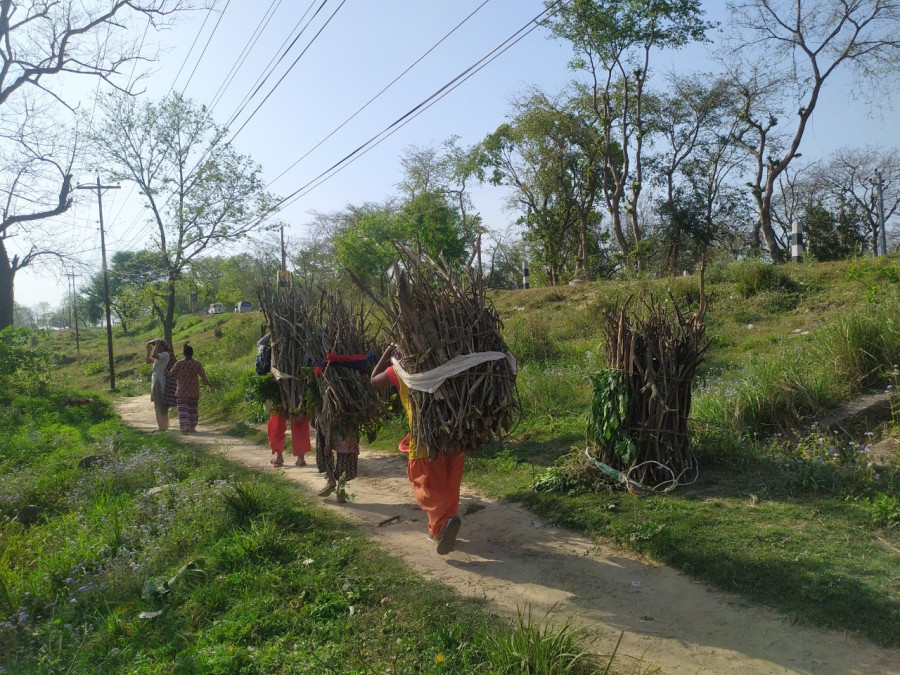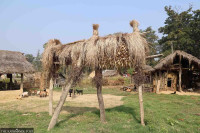On Sunday at noon, around a dozen women were walking on the empty streets in Kohalpur Municipality Ward No. 11 with a load of firewood on their backs. When they saw a team of security personnel patrolling the road, they turned the other way, travelled a bit further and took another route home. They knew they were defying the nationwide lockdown but not by choice.
The coronavirus crisis and the lockdown has robbed the women of their jobs. Daily essentials are emptying in their households and they can’t afford to buy cooking gas. Hence, they travel every day to the jungles to collect firewood.
This is how the women in Shantinagar spend their days.
Janaki Pariyar, a daily wage earner, said that she visits the jungles every other day in search of firewood.
“Besides the regular household chore, we have other things to take care of during this lockdown,” said the mother of four. “We have to manage food to eat and firewood to cook it. We are getting by so far but we don’t know how long we can manage if the lockdown continues.”
With everybody confined in their houses since the government has imposed a nationwide lockdown to prevent the spread of Covid-19, it’s the women who have to shoulder the extra burden of housework, Sumitra Nepali, whose husband returned from India two months ago, said. “For us, the lockdown has been a curse.”
It’s harder for those women who depend on daily wage to make a living.
“We have to do the housework while also making ends meet,” Sunita Shahi, another local from Shantinagar, said. “And the worse thing during the lockdown is we can’t go searching for work.”
Frequently asked questions about the coronavirus outbreak
UPDATED as of September 22, 2020
What is Covid-19?
Covid-19, short for coronavirus disease, is an illness caused by the coronavirus SARS-CoV-2, short for severe acute respiratory syndrome coronavirus 2. Common symptoms of the disease include fever, dry cough, fatigue, shortness of breath and breathing difficulties. In severe cases, the infection can cause pneumonia, severe acute respiratory syndrome, kidney failure and even death.
How contagious is Covid-19?
Covid-19 can spread easily from person to person, especially in enclosed spaces. The virus can travel through the air in respiratory droplets produced when a sick person breathes, talks, coughs or sneezes. As the virus can also survive on plastic and steel surfaces for up to 72 hours and on cardboard for up to 24 hours, any contact with such surfaces can also spread the virus. Symptoms take between two to 14 days to appear, during which time the carrier is believed to be contagious.
Where did the virus come from?
The virus was first identified in Wuhan, China in late December. The coronavirus is a large family of viruses that is responsible for everything from the common cold to Middle East Respiratory Syndrome (MERS) and Severe Acute Respiratory Syndrome (SARS). After an initial outbreak in Wuhan that spread across Hubei province, eventually infecting over 80,000 and killing more than 3,000, new infection rates in mainland China have dropped. However, the disease has since spread across the world at an alarming rate.
What is the current status of Covid-19?
The World Health Organisation has called the ongoing outbreak a “pandemic” and urged countries across the world to take precautionary measures. Covid-19 has spread to 213 countries and territories around the world and infected more than 31,405,983 people with 967,505 deaths and 22,990,260 recoveries. In South Asia, India has reported the highest number of infections at 5,557,573 with 88,943 deaths. While Pakistan has reported 306,304 confirmed cases with 6,420 deaths. Nepal has so far reported 65,276 cases with 427 deaths.
How dangerous is the disease?
The mortality rate for Covid-19 is estimated to be 3.6 percent, but new studies have put the rate slightly higher at 5.7 percent. Although Covid-19 is not too dangerous to young healthy people, older individuals and those with immune-compromised systems are at greater risk of death. People with chronic medical conditions like heart disease, diabetes and lung disease, or those who’ve recently undergone serious medical procedures, are also at risk.
How do I keep myself safe?
The WHO advises that the most important thing you can do is wash your hands frequently with soap and water for at least 20 seconds or use hand sanitizers with at least 60 percent alcohol content. Avoid touching your eyes, nose and mouth with unclean hands. Clean and disinfect frequently used surfaces like your computers and phones. Avoid large crowds of people. Seek medical attention if symptoms persist for longer than a few days.
Is it time to panic?
No. The government has imposed a lockdown to limit the spread of the virus. There is no need to begin stockpiling food, cooking gas or hand sanitizers. However, it is always prudent to take sensible precautions like the ones identified above.





 14.24°C Kathmandu
14.24°C Kathmandu















